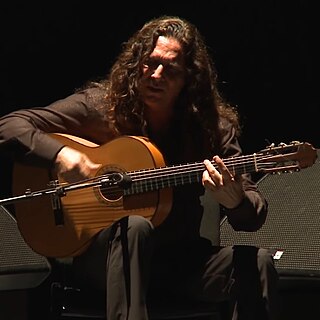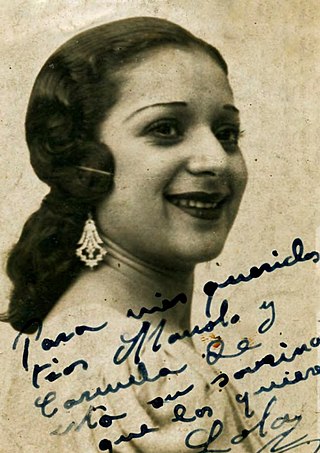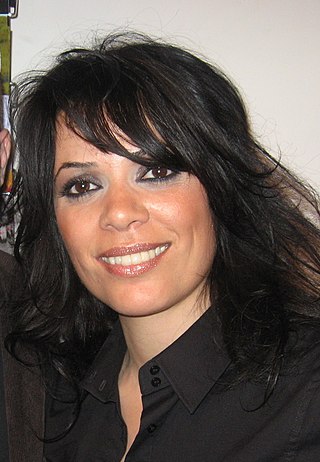Related Research Articles

Carmen Amaya Amaya was a Spanish Romani flamenco dancer and singer, born in the Somorrostro district of Barcelona, Catalonia, Spain.

José Fernández Torres, known as Tomatito, is a Spanish roma flamenco guitarist and composer. Having started his career accompanying famed flamenco singer Camarón de la Isla, he has made a number of collaborative albums and six solo albums, two of which have won Latin Grammy Awards.

José Monje Cruz, better known by his stage name Camarón de la Isla, was a Spanish Romani flamenco singer. Considered one of the all-time greatest flamenco singers, he was noted for his collaborations with Paco de Lucía and Tomatito, and the three of them were of major importance to the revival of flamenco in the second half of the 20th century.

Joaquín Pedraja Reyes is a Spanish classically trained ballet and flamenco dancer.

María Dolores "Lola" Flores Ruiz was a Spanish actress, bailaora and singer. Born in Jerez de la Frontera, Flores became interested in the performing arts at a very young age. Known for her overwhelming personality onstage, she debuted as a dancer at age sixteen at the stage production Luces de España, in her hometown. After being discovered by film director Fernando Mignoni, Flores moved to Madrid to pursue a professional career in music and film, with her first gig being the lead role in Mignoni's Martingala (1940). Flores succeeded as a film and stage actress. In 1943 she obtained her breakthrough role in the musical stage production Zambra alongside Manolo Caracol, in which she sang original compositions by Rafael de León, Manuel López-Quiroga Miquel and Antonio Quintero, including "La Zarzamora" and "La Niña de Fuego", mostly singing flamenco music, copla, rumba and ranchera. She then started to receive widespread media coverage.

Tony Gatlif is a French film director of Romani ethnicity who also works as a screenwriter, composer, actor, and producer.

Eduardo Cansino Reina was a Spanish-born American dancer and actor of Calé Roma descent. He was the father of actress Rita Hayworth.

Yasmin Levy is an Israeli singer-songwriter of Judeo-Spanish music.
The Romani in Spain, generally known by the endonym Calé, or the exonym gitanos, belong to the Iberian Romani subgroup known as Calé, with smaller populations in Portugal and in Southern France. Their sense of identity and cohesion stems from their shared value system, expressed among gitanos as las leyes gitanas.
Tonás is a palo or type of flamenco songs. It belongs to the wider category of Cantes a palo seco, palos that are sung a cappella. Owing to this feature, they are considered by traditional flamencology to be the oldest surviving musical form of flamenco. This musical form originated in the Calé Romani subculture of Southern Spain. The first known flamenco singer, Tío Luis el de la Juliana, who lived in Jerez de la Frontera in the last third of the 18th century, was said to have excelled in this palo.
The cante flamenco, meaning "flamenco singing", is one of the three main components of flamenco, along with toque and baile (dance). Because the dancer is front and center in a flamenco performance, foreigners often assume the dance is the most important aspect of the art form — in fact, it is the cante which is the heart and soul of the genre. A cante singer is a cantaor or cantaora.

Tchavolo Schmitt is a Romani jazz guitarist. Schmitt performed as a member of various ensembles in the 1970s. Then he settled in Strasbourg and left the professional circuit for a time, releasing solo albums in 2000. He played Miraldo in the Tony Gatlif film Swing.

Anna Russo is an Italian writer. She was born in Naples, and her debut as a writer partly came about after she received a major literary prize for travel writing: The Next Generation. As a result of the grant she lived for twelve years in southern France where she became close to the gypsies, particularly two of the "grand" families of Reyes and Baliardo. From this research and collaboration, she wrote two important books, Gitani si nasce e si diventa and El Cante Flamenco, which received support from the Spanish Consulate in Italy and by the Cervantes Cultural Institute.
Mónika Juhász Miczura is a Hungarian Roma singer, also known as Mitsou and Mitsoura. She is a former member of the folk ensemble Ando Drom, and a founding member of the electronic/world music group Mitsoura. She has contributed to film soundtracks; in Tony Gatlif's film Gadjo dilo (1997) she provided the voice of an unseen singer pivotal to the story. She has also sung in the films Kísértések (2002), Swing (2002), Vengo (2000) (uncredited), and Je suis né d'une cigogne (1999). She formed the ensemble Mitsoura that released two albums so far: Mitsoura (2003) and Dura Dura Dura (2008). She has been a guest artist on the albums of other groups, including Fanfare Ciocărlia's Queens and Kings (2007), Bratsch's Rien Dans Les Poches (2000), Besh O Drom's Once I Catch the Devil (2006), GYI! (2005) and Can't Make Me! - Nekemtenemmutogatol (2003). She is a member of the "Global Vocal Meeting" project.

Antonio Carmona Amaya is a Spanish gypsy singer of flamenco. He also has French nationality. From the early 1980s, he was a member of the Spanish flamenco-fusion group Ketama. that he joined after main vocalist Ray Heredia left. The band also included José Soto also known as "Sorderita". Ketama in its latest set-up included Antonio Carmona as main vocalist along with his brother, Juan José Carmona Amaya known as "El Camborio", and his cousin, José Miguel Carmona Niño known as "Josemi".
Flamenco is a 1952 Spanish documentary film directed by Edgar Neville. It was entered into the 1953 Cannes Film Festival.

Latcho Drom is a 1993 French film directed and written by Tony Gatlif. The movie is about the Romani people's journey from north-west India to Spain, consisting primarily of music. The film was screened in the Un Certain Regard section at the 1993 Cannes Film Festival.
Juan Ignacio Gómez Gorjón, better known as Juan Gómez "Chicuelo", is a Spanish flamenco guitarist from Barcelona, composer and director. Although he worked with a wide range of artists, Chicuelo is usually accompanied by the singer Miguel Poveda and singer Duquende, with whom he has toured extensively in Europe, Japan and the US and made many recordings with. He has also been musical director of Compagnie de Danse Japonaise Shohi Kojima since 1992, and musical director of the Somorrostro Dansa Flamenca with choreographer Javier Latorre since 2003.
Antonio Gómez de los Reyes known as Antonio Canales is a male flamenco dancer and choreographer born in Seville.
References
- ↑ Vengo , retrieved 2017-08-18
- ↑ Indiewire (12 September 2000). "Venice 2000 REVIEW: 'Andalusian Dog, Gatlif's 'Vengo'".